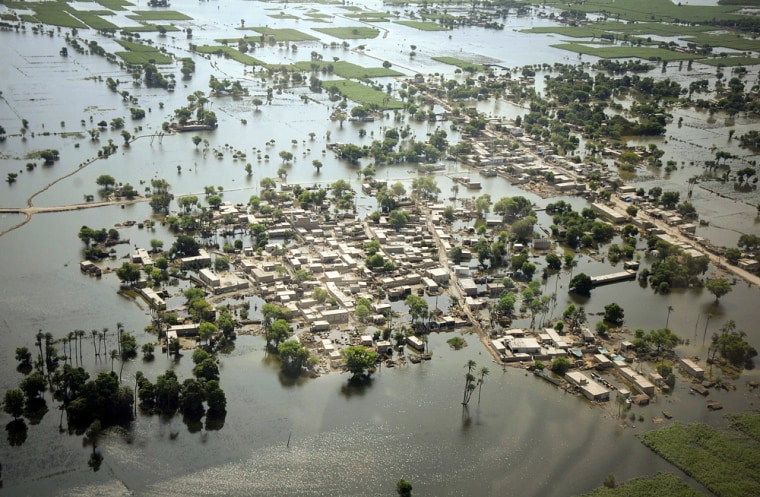The number of people suffering from the massive floods in Pakistan exceeds 13 million — more than the combined total of the 2004 Indian Ocean tsunami, the 2005 Kashmir earthquake and the 2010 Haiti earthquake, the United Nations said Monday.
The death toll in each of those three disasters was much higher than the 1,500 people killed so far in the floods that first hit Pakistan two weeks ago. But the U.N. estimates that 13.8 million people have been affected — over 2 million more than the other disasters combined.
The comparison helps frame the scale of the crisis, which the prime minister said Monday was the worst in Pakistan's history. It has overwhelmed the government, generating widespread anger from flood victims who have complained that aid is not reaching them quickly enough or at all.
"The number of people affected by the floods is greater than the other three disasters combined," Maurizio Giuliano, spokesman for the U.N. Office for the Coordination of Humanitarian Affairs, told The Associated Press.
A person is considered affected by the floods if he or she will need some form of assistance to recover, either short-term humanitarian aid or longer-term reconstruction help, said Giuliano.
The total number of people affected in the three other disasters was about 11 million — 5 million in the tsunami and 3 million in each of the earthquakes — said Giuliano.
Pakistani Prime Minister Yousuf Raza Gilani said Monday that the floods were a bigger crisis than the 2005 Kashmir earthquake that killed nearly 80,000 people and the army's operation against the Taliban in the Swat Valley last spring that drove more than 2 million people from their homes.
"The magnitude of the tragedy is so immense that it is hard to assess," said Gilani during a visit to the central Pakistani city of Multan.
Many of the people affected by the floods, which were caused by extremely heavy monsoon rains, were in Pakistan's northwestern province of Khyber Pakhtunkhwa.
Blow to the economyMeanwhile, the disaster is expected to be a major blow to Pakistan's fragile economy, the International Monetary Fund said on Monday.
The floods "are very likely to cause major harm to the economy in terms of loss of output and budgetary consequences," an IMF spokesman told Reuters. "In these circumstances, support from the international community will be critical."
The spokesman did not say whether the economic impact could affect Pakistan's $11.3 billion IMF program, but he said IMF officials were in touch with the authorities to assess the situation.
Rescue workers have been unable to reach up to 600,000 people marooned in the province's Swat Valley, where many residents were still trying to recover from last year's fight with the Taliban, said Giuliano. Bad weather has prevented helicopters from flying to the area, which is inaccessible by ground, he said.
"All these people are in very serious need of assistance, and we are highly concerned about their situation," said Giuliano.
Hundreds of thousands of people have also had to flee rising floodwaters in recent days in the central and southern provinces of Punjab and Sindh as heavy rains have continued to pound parts of the country.
One affected resident, Manzoor Ahmed, said Monday that although he managed to escape floods that submerged villages and destroyed homes in Sindh, the total lack of government help meant dying may have been a better alternative.
"It would have been better if we had died in the floods as our current miserable life is much more painful," said Ahmed, who fled with his family from the town of Shikarpur and spent the night shivering in the rain that has continued to lash the country.
'Living without food and shelter'
"It is very painful to see our people living without food and shelter," he said.
Thousands of people in the neighboring districts of Shikarpur and Sukkur camped out on roads, bridges and railway tracks — any dry ground they could find — often with nothing more than the clothes on their backs and perhaps a plastic sheet to keep off the rain.
"We were able to escape the floodwaters, but hunger may kill us," said Hora Mai, 40, sitting on a rain-soaked road in Sukkur along with hundreds of other people.
A senior government official in Sukkur, Inamullah Dhareejo, said authorities were working to set up relief camps in the district and deliver food to flood victims.
But an Associated Press reporter who traveled widely through the worst-hit areas in Sindh over the past three days saw no sign of relief camps or government assistance.
The floods hit the country at a time when the government is already struggling with a faltering economy and a brutal war against Taliban militants that has killed thousands of people.
The U.S. and other international partners have donated tens of millions of dollars and provided relief supplies and assistance.
In a statement, Obama's national security adviser, James Jones, said that the U.S. is sending a wide range of assistance to Pakistan. That includes $35 million in financial aid, added on to the $7.5 million already designated to help people in affected areas, as well as food, shelter, medical supplies and other items.
In addition, the U.S. has delivered 436,000 meals, 12 prefabricated bridges, 14 rescue boats, six large-scale water filtration units and a generator. U.S. helicopters are supporting rescue efforts and, along with other U.S. military aircraft, will continue to evacuate stranded citizens and transport supplies.
"The United States stands with the Pakistani authorities as they face the difficult challenges this natural disaster poses and will continue to work with the international community to increase assistance," Jones said.
A faltering relief effort could open the door to hard-line Islamist groups, which have already been delivering aid in the northwest.
